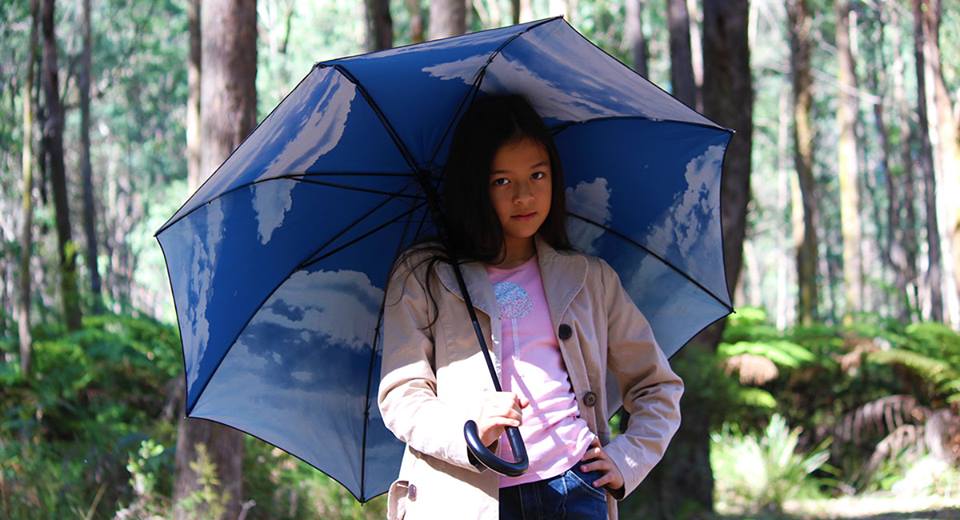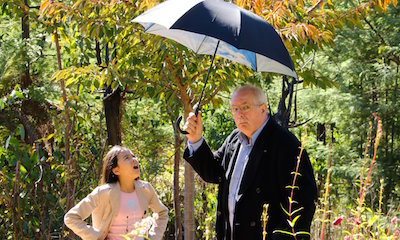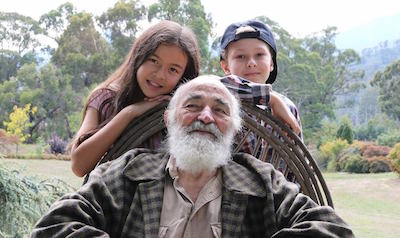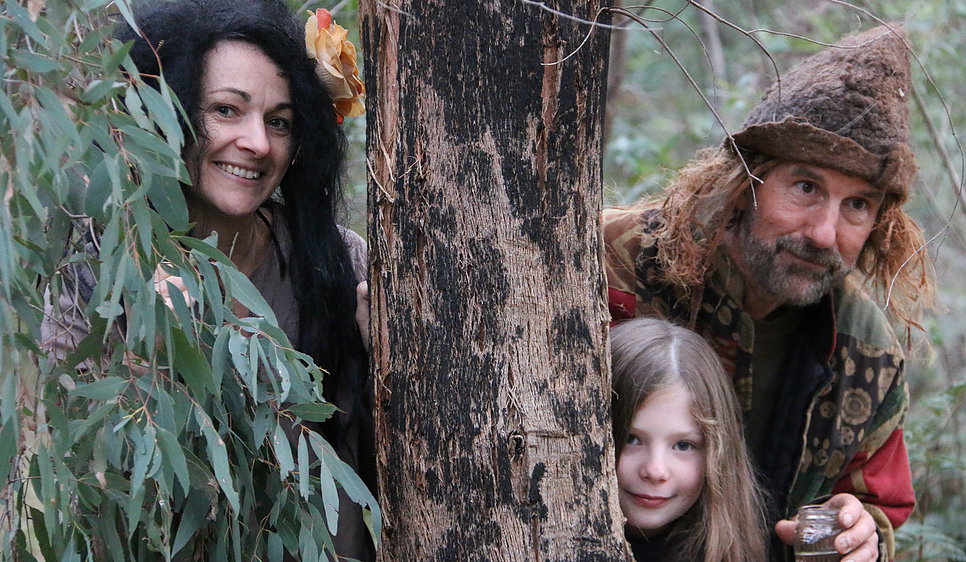ASHES AND DIAMONDS: THE ANNE RICHEY INTERVIEW
 Wednesday, January 6, 2016 at 4:03PM
Wednesday, January 6, 2016 at 4:03PM It would become known as ‘Black Saturday’, the day in February 2009 never to be forgotten by Australians. In the hinterland of the southern state of Victoria, bushfires decimated acres, laying to waste rural communities like Marysville, where 45 lives were lost. Filmmaker Anne Richey knew the area well and was devastated by the destruction. In the wake of the disaster, she was inspired to tell a story filled with hope and human spirit; and so was borne The Weatherman’s Umbrella, a fairy tale adventure bringing to life the unique artistry of a Marysville landmark, Bruno’s Sculpture Garden….

“I first visited Marysville for the National Screenwriters’ Conference about a year before the fires,” says Richey, ahead of a public screening of her film at Federation Square in Melbourne’s CBD. “I fell in love with the gorgeous little town.” Central to its charms was the work of Bruno Torfs, a South American-born artist who had crafted unique life-sized figures that greeted guests who walked a rainforest track in the heart of Marysville known as the ‘Sculpture Garden’. The artist’s estate was all but destroyed by the ‘Black Saturday’ flames. Recalls Richey, “I kept returning to the images over the following year or so, and when I heard that the garden had reopened I visited the town to see if Bruno would mind if I wrote a film inspired by his gorgeous garden.”
 Richey’s narrative framework uses much that family audiences will recognise from fairy tale lore. “Sarah’s journey echoes stories like Alice in Wonderland or The Secret Garden,” she admits. Played by ingénue Lily Morrow (pictured, top), our heroine encounters various eccentric denizens of a mystical forest as she helps a dithering weatherman (local identity Daryl Hull; pictured, right, with Morrow) find his lost parasol. Unlike the evening news variety who merely report and predict, Sarah’s new friend creates weather, and without his umbrella the region will go without rain.
Richey’s narrative framework uses much that family audiences will recognise from fairy tale lore. “Sarah’s journey echoes stories like Alice in Wonderland or The Secret Garden,” she admits. Played by ingénue Lily Morrow (pictured, top), our heroine encounters various eccentric denizens of a mystical forest as she helps a dithering weatherman (local identity Daryl Hull; pictured, right, with Morrow) find his lost parasol. Unlike the evening news variety who merely report and predict, Sarah’s new friend creates weather, and without his umbrella the region will go without rain.
Early in the script’s development, Richey organised a reading for the Marysville community in which Australian acting great John Wood voiced the titular role (the actor’s prior commitments prevented his casting in the film). “It was very important to me that it be done this way. I wanted to make sure that everyone was okay with the content of the story before we began making the film,” says Richey. “Fortunately, we didn’t receive any negative comments, and I think it helped that people knew about the storyline (before) helping out.”
 Ineligible for funding via both Screen Australia and Film Victoria, a determined Richey moved ahead with the shoot regardless, employing a no-budget work ethic that utilised non-pro actors (with the exception of industry veteran John Flaus, as Sarah’s Great Grandfather; pictured, right, with Morrow and co-star Jacob Vulfs) and crew drawn from the township and its surrounds. For Richey, this bare-bones approach proved a godsend. “It seemed as though every time I vaguely mentioned needing something, it (not only) appeared but was in a form which was so much better than I could have imagined,” she says. “It was a very lucky shoot in so many ways. When there’s virtually no budget, everything needs to be done creatively, and because of this it became a real community effort.”
Ineligible for funding via both Screen Australia and Film Victoria, a determined Richey moved ahead with the shoot regardless, employing a no-budget work ethic that utilised non-pro actors (with the exception of industry veteran John Flaus, as Sarah’s Great Grandfather; pictured, right, with Morrow and co-star Jacob Vulfs) and crew drawn from the township and its surrounds. For Richey, this bare-bones approach proved a godsend. “It seemed as though every time I vaguely mentioned needing something, it (not only) appeared but was in a form which was so much better than I could have imagined,” she says. “It was a very lucky shoot in so many ways. When there’s virtually no budget, everything needs to be done creatively, and because of this it became a real community effort.”
It may be the ‘community effort’ - the spirited sense of small town unity that the 16-month weekend shooting schedule captured - which proves to be The Weatherman’s Umbrella greatest legacy. “It’s a film which showcases the amazing talents and extraordinary landscapes around Marysville,” Richey says, who fostered the sense of family by using key locations and props that held special meaning for locals in the wake of the bushfire disaster. “While we were making the film, quite a few people told me that (we) had arrived at the perfect time. (Our) film didn’t have anything to do with the fires but was just about making something fun. People had rebuilt their homes and I think were looking for a way of moving forward.”
 For Richey, whatever positive energy the people of Marysville draw from her film merely reflects the unwavering commitment that they contributed. “It’s been great to see so many people in the area helping the film along its way,” she says. “The people involved in the film were so welcoming towards the project, and they were so inspiring. They’re such a generous, talented and kind group of people.”
For Richey, whatever positive energy the people of Marysville draw from her film merely reflects the unwavering commitment that they contributed. “It’s been great to see so many people in the area helping the film along its way,” she says. “The people involved in the film were so welcoming towards the project, and they were so inspiring. They’re such a generous, talented and kind group of people.”
Footnote: Bruno’s Sculpture Garden has been fully restored and now features over 120 of Torf’s original works; it was recently included amongst the 100 ‘Essential Experiences’ tourist sites in Victoria by the travel website Experience Oz. In The Weatherman’s Umbrella, Torf can be seen in the role of ‘Bearded Man’ (pictured, above).
Anne Richey will present The Weatherman’s Umbrella at a special event screening on Thursday, January 14 at Healesville Memorial Hall, Victoria. The film is available for community screening bookings via Fan-Force.


















